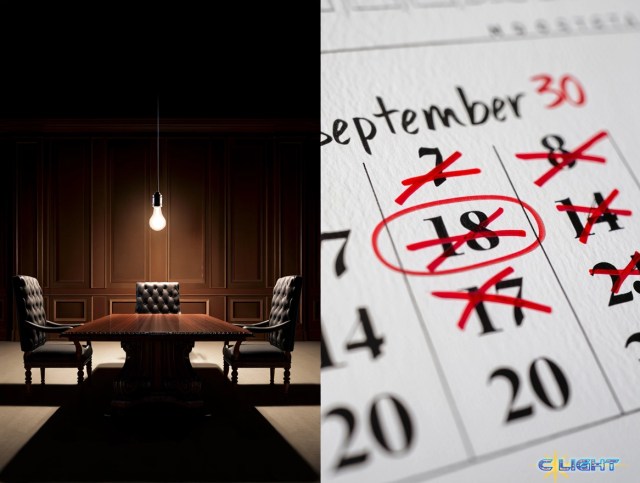5 minutes read time.
With the fiscal year set to expire in precisely one week, Washington is once again hurtling toward a government shutdown, not out of legislative necessity, but as a matter of political choice. At the heart of the impasse is a high-stakes gamble by President Felonious Punk, who, in a bid to secure a political upper hand, has opted for a strategy of confrontational obstruction that carries a significant risk of backfiring on his administration and his party. By refusing to even meet with Democratic leaders, the President is making a calculated bet that he can force a capitulation. However, in doing so, he is handing his opponents a powerful narrative and positioning himself to be the sole proprietor of a crisis that could have been avoided.
The Anatomy of an Impasse
On its face, the legislative dispute is straightforward. With government funding running out on September 30, Republicans, who control both chambers of Congress and the White House, have proposed a “clean” seven-week continuing resolution to keep agencies open through November 21. Democrats, however, are leveraging their necessary votes in the Senate to demand negotiations on key priorities, chief among them the extension of Affordable Care Act subsidies set to expire at the end of the year.
This policy disagreement, however, has been subsumed by a near-total breakdown in communication at the highest levels of the Senate. A “frosty pall” has reportedly settled over the relationship between Senate Majority Leader John Thune and Minority Leader Chuck Schumer, two veterans who have served together for decades. As of Tuesday evening, the two leaders had not spoken directly about a path forward, engaging instead in a standoff over who should initiate the call. Thune’s position is that Republicans have offered a reasonable stopgap measure, leaving nothing to negotiate. Schumer insists that Thune, needing Democratic votes to pass any bill, must be the one to open discussions. This personal stalemate between leaders encapsulates the broader dysfunction, transforming a solvable legislative hurdle into a perilous game of chicken.
The Presidential Tantrum
The defining moment of the standoff thus far came on Tuesday, when President Felonious Punk abruptly canceled a planned meeting with Schumer and House Minority Leader Hakeem Jeffries. The meeting, scheduled for Thursday, was intended to broker a path forward but was scuttled after Thune and House Speaker Mike Johnson reportedly urged the president not to attend. In a social media post, the President declared that a meeting could not “possibly be productive” after reviewing the Democrats’ “unserious and ridiculous demands”. He argued that Democrats had not yet figured out that there are “consequences to losing Elections”.
This decision to walk away from the table before even sitting down was a tactical gift to the Democrats. Schumer immediately accused the President of “running away from the negotiating table” and throwing a “tantrum” rather than doing his job. Jeffries repurposed a slogan, posting “Trump Always Chickens Out” and arguing that the President and his party were “running scared”. By refusing to engage, Felonious Punk single-handedly transformed the narrative from a complex legislative dispute into a simple story about a president who is unwilling to govern, allowing Democrats to credibly claim that he will “own the shutdown”.
A Changed Political Calculus
This standoff is not occurring in a vacuum. A key factor stiffening the Democrats’ resolve is the fierce backlash Schumer and several other Democratic senators received from their base in March. At that time, they voted with Republicans for a six-month funding extension to avoid a shutdown, a move Schumer justified as necessary to prevent catastrophic cuts to federal agencies. The base, however, saw it as a capitulation.
Schumer has made it clear that he will not make the same mistake twice, stating that “the world is totally changed from March”. He is now under intense pressure to use the leverage he possesses in the Senate, where Republicans need at least seven Democratic votes to overcome a filibuster. His position is now one of confidence, arguing that since Republicans control all levers of power, they will “absolutely” be blamed for any failure to keep the government open. This new dynamic, born from past political wounds, has made a simple compromise far more difficult, as Democrats see no political upside in caving to a president who refuses to even grant them a meeting.

The Perilous Blame Game
While both sides are already engaged in a messaging war to assign blame for a potential shutdown, the political terrain heavily favors the Democrats. The historical precedent is clear: the public tends to blame the party in power for government closures. With Republicans holding the House, Senate, and Presidency, their attempt to brand this “the Schumer shutdown” is unlikely to gain traction outside of their own base.
The President’s unpredictable nature further complicates his party’s position. Thune must navigate not only a defiant Democratic caucus but also a president who could change his mind at any moment, potentially leaving his own party leaders in a politically awkward spot. This forces Republican leadership into a cautious, reactive posture, unable to make a deal without the President’s blessing, which, as of this week, is not forthcoming.
Ultimately, the path to keeping the government open is clear, but it requires direct negotiation and compromise—two things the White House has explicitly rejected. The President’s strategy, likely advised as a show of force, appears to be a profound misreading of the political landscape. By creating a crisis and then visibly refusing to participate in its resolution, he is not projecting strength but is instead manufacturing an unforced error. Should the government close its doors next week, it will be difficult to see it as anything other than a shutdown of the President’s own making.
In the world of make-believe, this is how a situation such as this might be better handled.
Discover more from Clight Morning Analysis
Subscribe to get the latest posts sent to your email.










